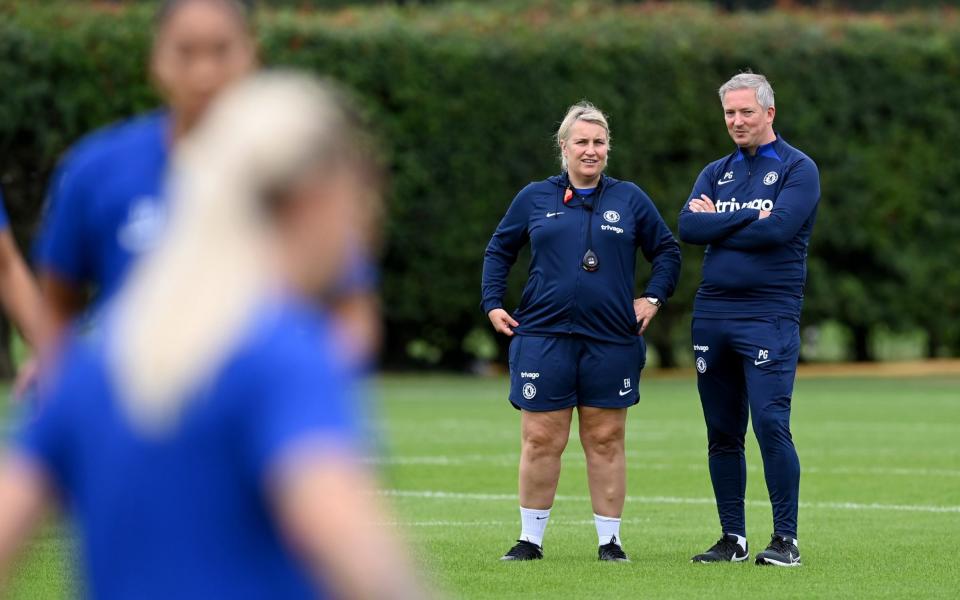How Emma Hayes turned Chelsea Women from part-time also-rans to a dominant force

Emma Hayes is trying to remember her first day as Chelsea manager. She presses her fingers to her eyes, then runs her hands through her hair and exhales loudly. "You know what, my brain fog means that everything gets a little bit harder to remember," she says.
You can't blame her for the bad memory, it was a full decade ago. Sunday marks 10 years of Hayes at the helm of the west London club she so adores and has lifted to the top of women's football in England. But it was not always that way, and she does not sugarcoat her distant memories.
On her first day, she hopped on a train from Waterloo early on a Sunday morning. Walking into the deserted Cobham training ground, she was not sure if she had made the right decision. "There wasn’t a single member of full-time staff that worked for the women’s section, let alone had an office, let alone had a desk," she says. "The starting point was zero, and that was both terrifying and exciting all at once."
Hayes had spent four years prior working in the US, at various teams in the Women's Professional Soccer championship – an earlier version of the National Women's Soccer League – and a different level of professionalism. But here, back home in London, she was to juggle her part-time role at Chelsea with managing her family's currency exchange in Covent Garden.
"Watching the team play, [I was] thinking, oh my god, this is a million miles from what I’ve just come from. The gulf was so big. I was like, I don’t know if I can go backwards. I didn’t know whether I was going to do it because I thought 'this is pretty low level'."
Appointing her former assistant and now general manager Paul Green was integral to her staying, after she secured funding from the club for his full-time role. For the first two seasons she was part-time, as were the players, and the team finished in the lower rungs of the Women's Super League, including second from bottom in 2013. Two years later, full-time and transformed by Hayes, the team were champions of England and had the FA Cup in their trophy cabinet.

Fast forward 10 years and the only constant has been Hayes and her vision. Her Chelsea team have won four FA Cups, three League Cups, reached one Champions League final and are five-time league champions – including the last three consecutive seasons. She now has a budget that stretches to spending hundreds of thousands on just one player – including record-breaking star signings like Sam Kerr and Pernille Harder.
In a league that is becoming more ruthless with managerial sackings, Hayes, 45, has remained secure. She is a household name thanks to her success, was awarded an MBE and is a well-respected pundit too. She is easily the most influential current manager in England. Looking at the platform she has built, she says she always understood the power of her voice, but that responsibility weighed heavy at times.
"I do feel lonely, at times, being 'the voice' in this country," she says. "I did feel like sometimes I wanted more from my colleagues in the game to shout as loud as I did – even if that was happening in private. I felt like to put my head out on the parapet – whether it was to create minimum standards, demand more for officials or professionalise the game – I just figured, you’ve got to do it. That's a sacrifice you’ve got to make, sometimes you have to do that as a leader. It's been lonely doing that for such a long time. However, I look across us now, the Lionesses, the coaches, and I feel like I don't need to shout the loudest anymore."
Seeing the England team win the Euros this summer was "magic", Hayes says. Like a number of clubs in the WSL, Chelsea have responded by hosting the women's team at Stamford Bridge for the first time in three years on their season-opener against West Ham.
While a "tipping point" moment, Hayes says it will not be a magic fix for the domestic game. She says drastic action is needed, starting with the FA moving away from managing the league and a considered plan for retaining interest and crowds.
"If anyone thinks that we are going to go from 2,000 to 20,000 overnight, I don't believe that will be the case. I still think it will be a gradual build," she says. "I think it's important we try to establish these big stadium events as regular things, rather than just once a year, ideally move towards a six or eight game situation, and then I still think there is work to be done."
As for her legacy at Chelsea, Hayes is not sure. “It changes. I used to really think of my tombstone saying 'winning' and 'determined' as my mates always tell me, but the reality is I just want to be known as being a good person. And I am and I care about that.
"But even in an industry which is so ruthless, I've got a good heart and I just want to give the best I possibly can. I never thought I’d be here 10 years. I certainly think we’ll all be shocked if it’s 20."

 Yahoo Movies
Yahoo Movies 